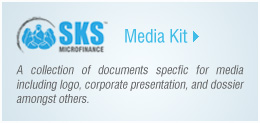
|

|
SKS NGO empowers 150 Ultra poor women
May '2009
The 150 women who graduated were selected based on the criteria that over the 18 months they have managed to have multiple assets base (more that one productive asset in the household); cumulative savings of Rs 800; awareness about health care, hygiene, social issues and government programs; food buffer at household for a month. Commenting on the Graduation ceremony, Vikram Akula, Founder President, SKS NGO said, "It is a proud moment to see the 150 women transform from diffident unskilled women to women who are confident and have skill sets to run their own enterprise. Now they are on the path to financial empowerment." For eighteen months, the beneficiaries are educated on finance, health and social development. The beneficiaries are trained on economic development, which involves savings, livelihoods selection and 3-6 days of skills training. Savings inculcates a sense of financial discipline in members and provides cushioning during crisis events. The program has mapped the nutrition intake of the beneficiaries through regular health check ups. Awareness about herbal medicines that are readily available is provided to the beneficiaries. Hemoglobin benchmarking, de-worming, iron & folic supplements are provided to the beneficiaries under the supervision of the physician. Since the ultra poor live in the margins of the society, they lack the social support. In the program, they are encouraged to form group solidarity. The beneficiaries are also provided with a hotline, where they could share with the SKS field assistant their joys and sorrows. Encouraged by the success of the program, SKS will replicate the program in 500 households of Narayankhed and 1000 tribal households in Koraput, Orissa.
|












